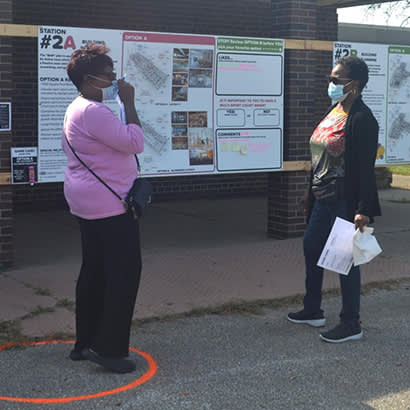
For an enhanced digital experience, read this story in the ezine.
How community trust and support effect change
Across 11 million acres of parkland in the United States, park and recreation professionals are hard at work building, preserving and protecting climate-ready parks. But we are not doing it alone. Public-private partnerships are central to creating the conditions for long-term success. Community engagement is the foundation for resilience discourse, and community development organizations elevate the urban community voice.
As director of neighborhood resilience, safety and business district services for Jefferson East Inc. (JEI) — a nonprofit organization that partners with neighborhood residents and businesses to support development, greater resources and investments in 13 distinct riverfront neighborhoods in Detroit — my work has centered park-based solutions to build neighborhood environmental resilience.
My first exposure to neighborhood environmental resilience was on the Lenox Center/A.B. Ford Park, a $4 million public-private partnership to renovate the park and center. I was the community engagement and economic development manager for East Jefferson Development Corporation (EJDevCo). I was tasked with helping Detroit’s General Services Department (GSD) incorporate the values and needs of the community into the design of the center. Engagement started in May 2020, which was early in the coronavirus (COVID-19) pandemic. Initially, there was resistance to this project because some community members wanted the city to reallocate dollars to renovate the pool building at Maheras-Gentry Park instead.
It was important to hear from as many community voices as possible. To do that, an Every Door direct-mail piece was created with project information, and signs were posted throughout the neighborhood. The mailer and signs informed community members about the coming online engagement survey — which was not a familiar platform to many residents at the time — and linked them to the community survey crafted by the project team. The team offered the survey online, by phone and via paper survey. Respondents could return the paper survey at a drop box at the Lenox Center. The team received 172 detailed responses for both the park and center. Because of the multiple forms of outreach and efforts to meet community members where they were at, EJDevCo was able to gather detailed opinions and keep people safe. The first engagement was held online in June 2020 and was well attended. To keep the conversation going, staff members held weekly virtual office hours for six months to keep abreast of community needs.
A Change of Plans
On August 5, 2020, GSD shared the results of the survey and INFORM Studio, which was contracted to design the center, presented initial observations of the existing conditions of the park and center. When they shared the survey results, the overwhelming majority of residents agreed with the resulting data. The park was unsafe and filthy. Residents were more concerned about the flagrant criminal behavior that was happening on the site than the design. The topics were wide-ranging, but the community expressed two important values. They wanted the park and building to be clean and safe.
Then, INFORM Studio let the community know the building they expected to be remodeled would instead have to be moved and rebuilt because it was located in a floodplain. Visibly upset residents shifted their concern to the building being demolished. Why, they asked, would the building have to be moved out of the floodplain, when most residents in Jefferson Chalmers live in homes that are in the floodplain?
On September 12, 2020, to answer that question, the team held an in-person park event to ask residents for feedback on the building and park design, as well as their priorities. The existing Lenox Center was used as the staging ground and painted on the building was a line that showed how high flooding could be on the building if another 100-year floodplain event occurred. This visual representation helped drive home the urgency of the building relocation. Once the community saw the necessity of relocation, the team spent the remaining fall and winter months refining the design.
The Lenox Center and A.B. Ford Park project shows that engagement requires community trust, and much of that is fostered through longstanding partnerships with community organizations. In the summer of 2021, the Jefferson Chalmers neighborhood suffered unprecedented rainfall. A residential declaration of emergency was issued. Due to damage to water and sewage facilities, extraordinary amounts of combined sewage were discharged into Fox Creek on the community’s eastern edge. While the JEI team was working to help residents with flooded basements, the center design team focused on building them a clean, safe resiliency hub. Tragedy showed that the course the team was on was necessary.
The work continued over the next two years with continued engagement, and physical building began. The building framing and exterior are scheduled to be completed by the end of summer 2023. The city is leading the renovation of the parkland based on the lessons learned from the shared experience of a pandemic, floods and years of building community trust.
Lutalo Sanifu, MURP, is Director of Neighborhood Resilience, Safety and Business District Services for Jefferson East Inc.

